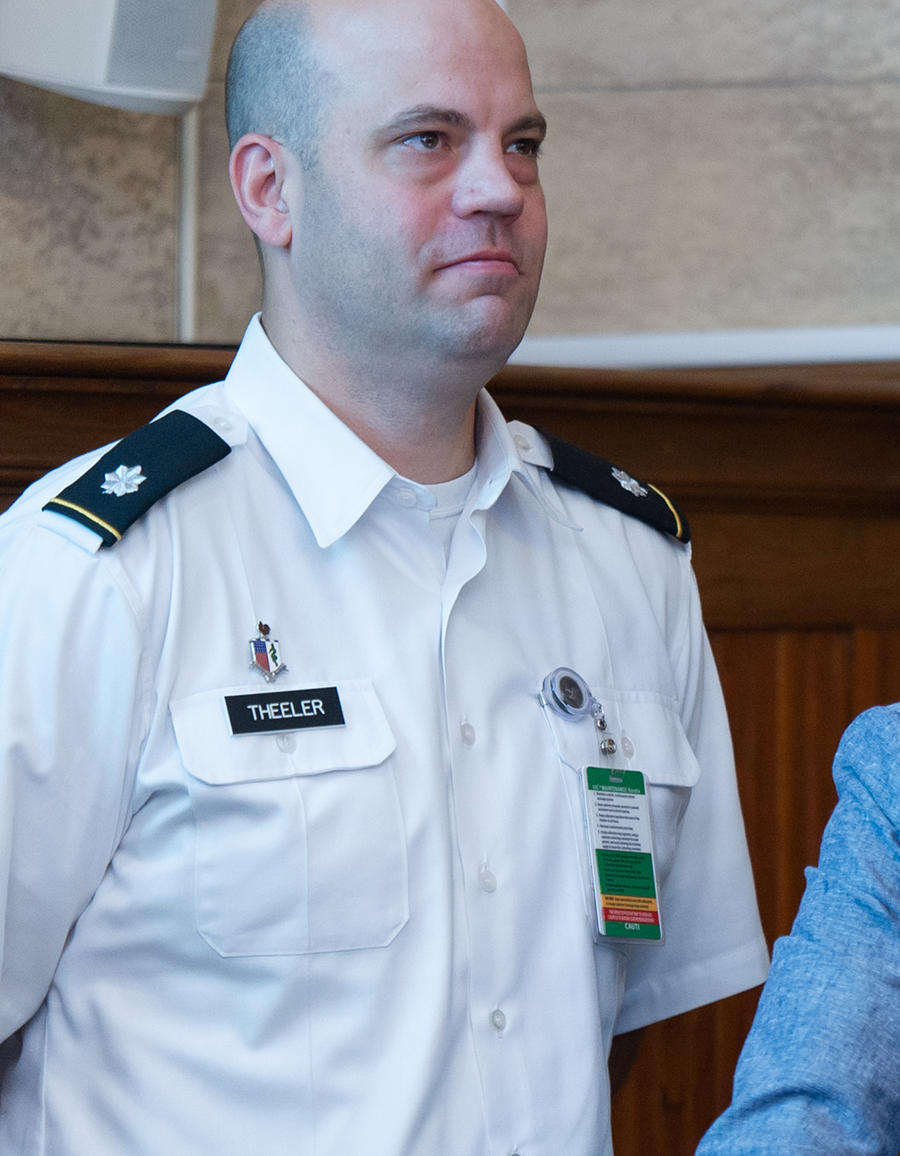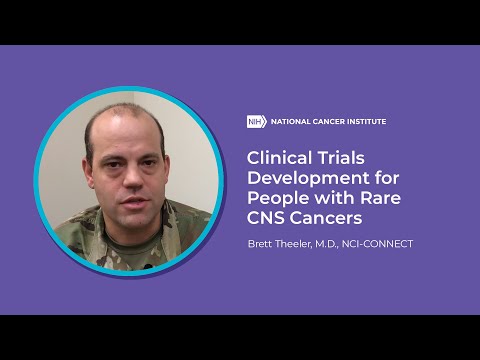Army Neurologist Helps Provide Multidisciplinary Care to Rare CNS Tumor Patients
, by Brittany Cordeiro, NCI-CONNECT Program Manager
Read how Dr. Brett Theeler is helping treat and educate patients with PXA and APXA tumors, which are among the rarest of the rare brain and spine cancers.
Treating people with rare central nervous system (CNS) tumors takes an army—literally. Walter Reed National Military Medical Center Neuro-Oncologist Brett Theeler, M.D., has partnered with NCI’s neuro-oncology team to treat patients.
Dr. Theeler is a Lieutenant Colonel in the United States Army. He joined Walter Reed in Bethesda, Maryland, in 2012, after finishing his neuro-oncology fellowship at The University of Texas MD Anderson Cancer Center in Houston, where he trained under Mark Gilbert, M.D., chief of the NCI Center for Cancer Research's Neuro-Oncology Branch. Dr. Theeler joined the Neuro-Oncology Branch as a clinical collaborator in 2015.
At Walter Reed in Bethesda, Dr. Theeler treats active duty service members and their family members, military retirees, and veterans with brain or spine cancers.
Neuro-oncology clinical care at NIH is team-oriented and multidisciplinary. Working with the Neuro-Oncology Branch has improved the care I am able to provide for patients at Walter Reed.
He also participates in the development of clinical trials, educational activities, and workshops for rare CNS tumors as part of NCI-CONNECT.
To this end, Dr. Theeler is treating and learning about patients with one of the rarest of rare CNS cancers called pleomorphic xanthoastrocytoma (PXA) and anaplastic pleomorphic xanthoastrocytoma (APXA). There are fewer than 100 people diagnosed per year in the United States with a PXA or APXA, and there is an estimated 1,081 people living with PXAs and APXAs in the United States.
“The biggest challenge is there is no standard of care for these tumors after surgery. Whether radiation therapy after surgery is needed and improves outcomes is unproven. There are no proven chemotherapy options for patients who recur after surgical resection,” Dr. Theeler says. “Conducting a clinical trial specific to PXA patients would be extremely difficult due to the rarity of these cancers.”
Overcoming PXA and APXA Research Challenges
In addition to PXAs and APXAs being extremely rare tumors, they present for clinical care in different ways. Some patients experience seizures and sometimes present with drug-resistant epilepsy. Motor, speech, or cognitive impairments may lead to neuroimaging and a brain tumor being discovered. Patients may be getting a brain magnetic resonance imaging (MRI) scan for common conditions, especially headaches, when their PXAs are found incidentally.
“Most patients come to us either having surgery or radiation or both, and we emphasize the need for expert pathology review of the tumor tissue,” Dr. Theeler says. “The analysis can ensure an accurate diagnosis and help us determine the best treatment approach.”
PXAs or APXAs can mimic other primary brain tumors microscopically, and can even be mistaken for aggressive brain cancers, particularly glioblastoma. Neuropathology review and advanced tumor profiling, such as methylation profiling, may be needed to accurately diagnose PXAs in some cases. NCI’s molecular neuropathologist, Kenneth Aldape, M.D., is leading the review of all CNS tumor tissue for NCI-CONNECT.
Studying PXA and APXA tumor tissue is the first step to better understanding these tumors. Sixty percent of PXA and APXA tumors have a specific mutation in the BRAF gene (the BRAF V600E mutation). This type of BRAF mutation has been found in other types of cancer, including melanoma and lung cancer. Targeted agents that block the BRAF protein are approved for use in patients with metastatic melanoma and other non-CNS cancers.
PXAs, APXAs, and other brain tumors with BRAF V600E mutations have been treated by a type of trial called a basket trial with the BRAF blocking drugs vemurafenib and dabrafenib. “Basket trials enroll patients with different types of cancer—no matter where the cancer is in the body—if the cancers all share the same oncogene mutations,” Dr. Theeler explains. “Basket trials enable patients with rare cancers to participate in clinical trials and allows researchers to study drugs to treat the rare tumors.”
Study results from a basket trial using vemurafenib showed three of six patients with PXAs had a tumor response. The results were published in the Journal of Clinical Oncology. Dr. Theeler is working with NCI-CONNECT to develop more basket trials using the next generation of targeted therapies for rare CNS cancers, including PXA.
Educating Patients to Participate in Clinical Studies
Dr. Theeler believes that every patient who has a rare CNS cancer should consider visiting the Neuro-Oncology Branch—or another comprehensive neuro-oncology program with experience treating patients with rare cancers—at least once.
“We are collecting patient information and tumor tissue as part of our Natural History Study to increase our knowledge and build a community of patients with rare CNS cancers through NCI-CONNECT,” Dr. Theeler says. “We hope to recruit enough patients so that we can have clinics dedicated to patients with PXA and APXA.”
During an NCI-CONNECT Clinic visit, patients meet others with their same diagnosis, as well as a multidisciplinary team of experts that has experience treating rare tumors. “We understand a rare cancer diagnosis can be very isolating. While I can’t say I have walked in their shoes, I can tell patients we have seen others with their type of cancer. I hope that can give them peace of mind when we provide treatment advice,” Dr. Theeler says.
He is grateful for the opportunity to collaborate with other neuro-oncologists and researchers at the Neuro-Oncology Branch, care for patients with rare cancers, and develop clinical trials for these patients.

